- Region
- Vega baja
- Marina Alta
- Marina Baixa
- Alicante
- Baix Vinalopo
- Alto & Mitja Vinalopo
-
ALL TOWNS
- ALICANTE TOWNS
- Albatera
- Alfaz Del Pi
- Alicante City
- Alcoy
- Almoradi
- Benitatxell
- Bigastro
- Benferri
- Benidorm
- Calosa de Segura
- Calpe
- Catral
- Costa Blanca
- Cox
- Daya Vieja
- Denia
- Elche
- Elda
- Granja de Rocamora
- Guardamar del Segura
- Jacarilla
- Los Montesinos
- Orihuela
- Pedreguer
- Pilar de Horadada
- Playa Flamenca
- Quesada
- Rafal
- Redovan
- Rojales
- San Isidro
- Torrevieja
- Comunidad Valenciana
article_detail
Spanish News Today Editors Roundup Weekly Bulletin Feb 17
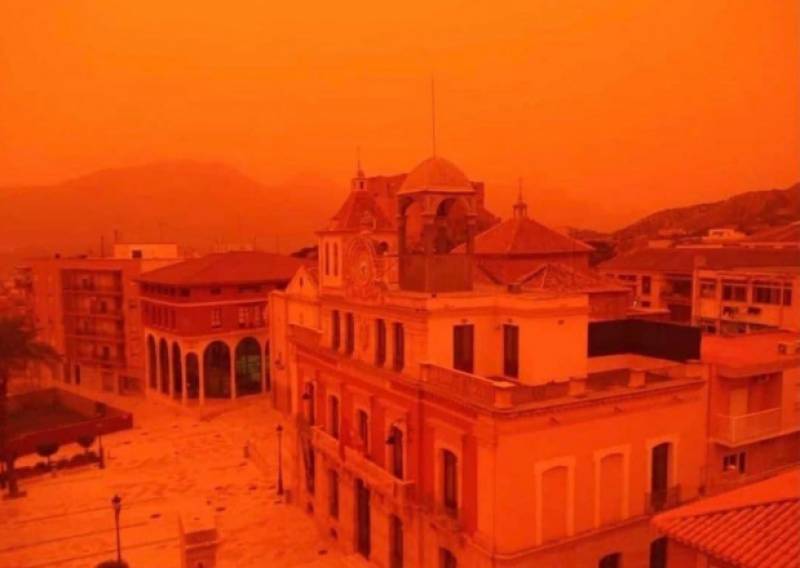
FEATURE ARTICLES: "Saharan dust returns to Spain" and "Another caravan fire calls into question safety at Spanish campsites"
As Carnival fever kicks into high gear in Spain and the dust settles on the Turkey-Syria earthquakes, there is fear that a new bout of Saharan dust – that orange muck that floats over to Spain on the breeze from Northern Africa – could ruin more than one spectacular gala outfit. For now, most of the red dust has been swirling around the Canary Islands, where the biggest Carnival celebrations outside of Rio de Janeiro are held in Tenerife, but there have also been episodes in the south of mainland Spain. Don’t worry too much, though, it won’t be anywhere near as bad as this time last year.
Also not as bad as last year is the latest fire to rip through a Murcia motorhome site, though that’s no excuse for the fact that these blazes keep occurring in camping grounds where the pitches are clumped too close together and there are few fire extinguishers or water pumps for firefighters to use.
We’ve also got news for you on some upcoming changes to a couple of ways of getting residency permits in Spain, plus Gary Glitter…
Dust bowl
It’s been a fairly changeable and pretty dreary week for most in Spain weather-wise but the good news is that this weekend is to be mostly dry and the mercury is climbing, with the thermometers in some places even hitting 5 or 10 degrees higher than normal for this time of year. Far from getting to enjoy a relaxing few days in the garden though, some people in southern Spain will need to batten down the hatches as another ‘calima’ is headed our way.
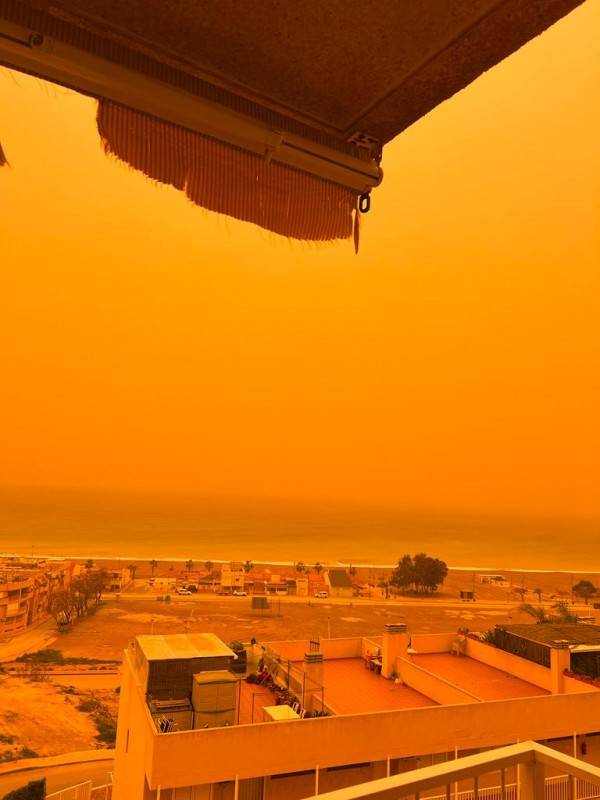 For those who don’t know or have blocked it from their memories, a calima is a Saharan dust cloud blown over from Africa and a DANA storm that’s been hanging around the Canary Islands for the last few days will carry the suspended particles to the south of the Spanish peninsula. Last March we had a particularly bad episode of calima, which turned the sky an eerie orange colour and bathed every available surface in a fine layer of messy grit.
For those who don’t know or have blocked it from their memories, a calima is a Saharan dust cloud blown over from Africa and a DANA storm that’s been hanging around the Canary Islands for the last few days will carry the suspended particles to the south of the Spanish peninsula. Last March we had a particularly bad episode of calima, which turned the sky an eerie orange colour and bathed every available surface in a fine layer of messy grit.The current dust cloud began descending on the autonomous city of Melilla on Tuesday February 14 but the haze has been spreading since the middle of the week, reaching its climax on Friday February 17, and it will still be hanging around this Saturday and Sunday.
Suspended dust, aside from being a nuisance and covering cars, patios and terraces in a dirty film, can actually be very detrimental to health, especially for vulnerable groups or those with certain underlying medical conditions.
For this reason, the authorities advise anyone with respiratory conditions to avoid spending too much time outside during calima episodes.
Spain and the rest of the world is experiencing more and more extreme weather phenomena like DANAs thanks in part to climate change, which is why there’s a big global push on using more renewable hydrogen to power large industry. Hydrogen is essentially classed for its production of energy from renewable sources and is a non-fossil replacement for gas. The EU has given each country a quota of how much of this environmentally-friendly energy they should produce.
Now Spain is ideally placed to make use of electricity generated by wind, photovoltaic and other green energy for producing green hydrogen but the authorities here were left furious this week when Brussels sided with France and agreed that renewable hydrogen made using nuclear power could be counted towards its hydrogen quota.
The battle between France and other nations over nuclear-based hydrogen has already delayed the publication of the EU’s new targets by several months, and Spain now has a two-month window to lodge its objections to the rules.
Caravan fire
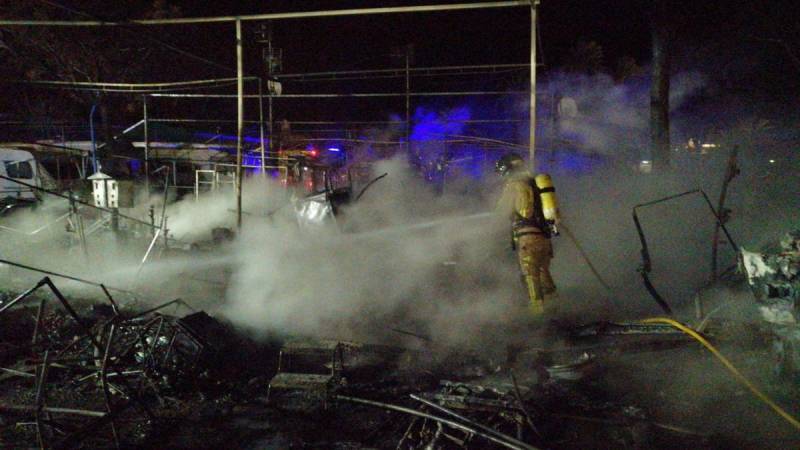
There was tragedy at the Bolnuevo campsite in the Region of Murcia’s Mazarrón this week when a massive fire burnt through an entire block of caravans in the early hours of Tuesday morning. While most of the people in their caravans at the time were fast asleep at nearly 2 o’clock in the morning, a fire broke out, supposedly from a faulty gas cooker, though that hypothesis has yet to be confirmed.
The flames spread rapidly to other caravans nearby, where they are all squeezed in like sardines, and fire crews from Mazarrón, Lorca and Alhama de Murcia were all called in to extinguish the blaze. Thankfully, nobody was seriously injured but three people had to be treated for anxiety attacks.
Those whose caravans and homes were destroyed or who had to be evacuated for their own safety were rehoused in other caravans and bungalows in the campsite’s own facilities. The pitches at the Bolnuevo site are notoriously close together, but it’s by no means the only one in the Region of Murcia. Fires break out periodically in campsites all over the Region, most notably at the Villas Caravaning site in La Manga, where a man sadly lost his life in a fire last April, leading the campsite to lose its operating licence due to a lack of fire safety measures.
While Cartagena authorities are to be congratulated in that case for forcing the campsite managers to be more responsible, it’s clear that Murcia as a whole has a grave problem with fire safety at its motorhome sites, and more stringent oversight is needed across the board.
More and more people – whether they are foreign tourists coming to Spain, local expats living here or native Spaniards – are choosing caravanning holidays, and the Region of Murcia is one of the country’s most popular and fastest growing choices for campers. The number of new campsites is growing all the time to accommodate this burgeoning motorhome tourism and to stop people from illegally parking their caravans and campervans near beaches where they’re not allowed.
But unless and until the existing campsites and static caravan parks that play fast and loose with their health and safety measures (and the worst offenders know who they are) are brought up to scratch, then disasters like the one in Bolnuevo this week will continue to occur, possibly with even more tragic consequences than this one.
Visas and residency

In a move aimed at boosting the economy and cracking down on the number of foreigners living and working in Spain without the correct permits, the government has announced that foreigners in irregular situations in Spain will soon be offered temporary residency provided they have been living here for two years and enroll in a Vocational Training (FP) course. They also must not have a criminal record for the past five years.
The details are still being ironed out between education heads, but the plan is to have the new legislation approved by May so that students can sign up for the 2023-2024 academic year.
The temporary permit will remain valid for the duration of the course but if the student receives a job offer at the end, they will also be permitted to apply for a two-year residency in Spain.
At the same time, some Spanish political parties want to abolish – or at least make radical amendments to – the so-called ‘Golden Visa’ scheme, which gives out Spanish residency to non-EU citizens in exchange for large financial investments in the country’s economy or real estate market.
The call came after Ireland stopped accepting new application for its own Golden Visa programme this week, having decided that their economy had recovered sufficiently since they first introduced it in 2012 to not need that kind of investment any more.
Spain’s Golden Visa scheme was introduced in 2013, and in the first five years gave residency status to 100,000 foreigners who invested in the Spanish economy or housing market.
The main gripe with the Golden Visas in Spain is that the origin of the capital is not actually checked, and it’s feared that an increase in the number of Saudi, Qatari and Chinese people applying for residency with substantial cash injections could mean ‘dirty money’ coming into the country.
Más País, the political party pushing for a change in the Golden Visa laws, also claims that it leads to ‘speculation’ on the housing market and “is pushing up prices and driving residents out of their neighbourhoods”, which, in contrast to its stated aim of bringing more financial wealth into the country, is not actually beneficial for the national economy.
So far, the central Spanish government isn’t actually entertaining this proposition. For now, it seems, they are willing to keep accepting more new foreign residents – be they moneyed investors or unskilled workers looking to get into the job market – especially in the face of a falling birth rate.
Murcia
The new Grand Hyatt La Manga Club Hotel has an official opening date now, and the renovated luxury hotel is due to start welcoming guests on Monday May 15. They are taking reservations already, and if you book now you can get 20-30% off on stays at the hotel and resort until mid-July.
 Also opening is the Mining Museum of La Unión, which has been in the pipeline for 15 years and is finally due to open its doors to visitors on Friday February 24. The project has cost the local Council close to 2 million euros after suffering countless delays since it was first planned in 2008. Now, though, the museum is ready to start educating visitors about the mining history of the area.
Also opening is the Mining Museum of La Unión, which has been in the pipeline for 15 years and is finally due to open its doors to visitors on Friday February 24. The project has cost the local Council close to 2 million euros after suffering countless delays since it was first planned in 2008. Now, though, the museum is ready to start educating visitors about the mining history of the area.There will be a large exhibition room with a permanent collection and you can even immerse yourself in a true mining experience in the depths of the basement. One of the main attractions will be the spindle, the only one of its kind in Spain, which was used for extracting water and minerals in days gone by and which was declared an Asset of Cultural Interest (BIC) back in 2018.
In Mazarrón and the surrounding areas, including the Port of Mazarrón and the Camposol urbanisation, a court decision in the last few days has finally – and predictably – upheld the legality of the municipal gardening contract after challenges against it were filed jointly by the opposition party and the company that currently provides the gardening service.
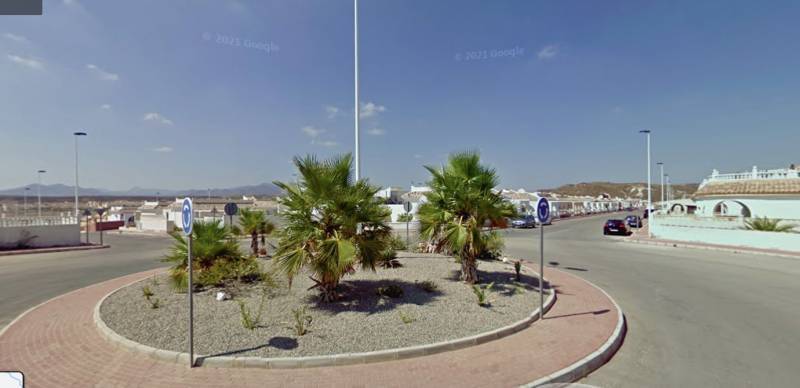 The new municipal gardening contract was originally put out to tender as long ago as December 2021, with an expanded remit for more green areas in B, C and D sectors of Camposol that the Council and the company delivering the service would be responsible for maintaining for the first time ever, but has been held up in legal troubles ever since “on technical grounds”. In reality, those opposing the contract barely had a leg to stand on but took it to the courts anyway just to tie it up for as long as they could.
The new municipal gardening contract was originally put out to tender as long ago as December 2021, with an expanded remit for more green areas in B, C and D sectors of Camposol that the Council and the company delivering the service would be responsible for maintaining for the first time ever, but has been held up in legal troubles ever since “on technical grounds”. In reality, those opposing the contract barely had a leg to stand on but took it to the courts anyway just to tie it up for as long as they could.Now though, the new contract should be signed before the end of this month and work can begin to care for “100%” of the municipality’s green spaces within the next 20 days.
This isn’t the first time the Mazarrón opposition party has lodged legal challenges against municipal projects that have included Camposol; a road improvement program which included the asphalting of the dual carriageway Avenida de los Covachos, which runs through sectors C and D, was held up for many months and is still in the drafting stage.
Remember, there’s still loads of Carnival stuff going on this weekend and next across Murcia and Alicante – check out what’s going on in your area for Carnival 2023!
For more fun activities going on in Murcia and Alicante, check out our EVENTS DIARY:
Spain
Most of the world was gripped by the rising tensions between the US and China earlier this month when a suspected spy balloon was shot down by the American authorities. But closer to home, the Ministry of the Interior in Spain has admitted that it is “checking all the facts” following rumours that the Chinese government is operating “secret police stations” in different European countries to keep tabs on its citizens abroad.
Although China denies the allegations, it’s widely speculated that Beijing continues to persecute dissidents in Spain and elsewhere by using clandestine police to promote the ideology and policies of the Chinese government.
For its part, the Chinese government insisted that while it has “service police stations” abroad to assist its citizens, its officers have not engaged in any actual “police activity”.
The police in Spain have plenty to contend with at the moment since seven of the UK’s Most Wanted criminals are still at large on the peninsula, most of whom are believed to be hiding out in the Costa del Sol.

A year ago, the British authorities, in conjunction with Crimestoppers and the Spanish forces, launched a massive campaign to track down 13 highly dangerous fugitives who fled the UK after committing their crimes. It was a success and to date, six of the gangsters have been arrested and either deported from Spain or are awaiting extradition orders.
However, seven are still on the loose somewhere in the country so the authorities have renewed their appeal to the public to report any sightings of the fugitives.
Spain has long been a haven for foreign criminals who often blend seamlessly into the large expat communities dotted around the country, but residents are up in arms this week over the news that convicted paedophile Gary Glitter is considering relocating here.
 In 2015, the 70s pop icon was jailed for 16 years for sexually assaulting three schoolgirls but was granted early release this month after serving just eight years. The 78-year-old is currently holed up in a bail hostel in the south of England but he will soon be free to move further afield and it seems his sights are set on Spain, where his 21-year-old son Gary Pantoja Sosa now lives.
In 2015, the 70s pop icon was jailed for 16 years for sexually assaulting three schoolgirls but was granted early release this month after serving just eight years. The 78-year-old is currently holed up in a bail hostel in the south of England but he will soon be free to move further afield and it seems his sights are set on Spain, where his 21-year-old son Gary Pantoja Sosa now lives.The disgraced rocker, whose real name is Paul Gadd, reportedly told his son he’d like to move to Spain to “keep a low profile” since he considers Britain to be too dangerous.
The Spanish authorities have yet to comment on the rumours but it seems they’ll be unlikely to relish the thought of welcoming a man the UK police described as a “habitual sexual predator who took advantage of the star status afforded to him”.
Today, Glitter is classed by the authorities as a ‘level 3’ offender – someone who is still considered “dangerous” and “capable of causing serious harm”.
Alicante
As the tourist capital of the Costa Blanca, tens of thousands of Brits and other tourists flock to Benidorm for its climate, bars and restaurants and of course its stunning coastline. For years, the resort has flown Blue Flags at its main beaches, a prestigious recognition of its pristine shores… until this year. To the fury of municipal officials who pride themselves on the town’s pristine shores, Poniente beach lost its flag due to water quality problems last year.
In response, the City Hall has taken the risky decision not to put any of its beaches forward this summer for the Blue Flag award, a demanding and stringent process that is synonymous with quality and safety around the world.
The refusal to take part in the process was confirmed by José Palacios, president of The Association for Environmental and Consumer Education (Adeac), who said that while “it’s the first time that it has happened” in Benidorm, “the Blue Flag program is voluntary, that is, the municipality freely decides to present itself or not”.
Several officials, including Benidorm’s mayor, have explained that many beach improvement works are in the pipeline for 2023, which makes it impractical to apply for the flags. However, the Adeac representative admitted that it’s not quite there yet. Blue Flag or no, Benidorm’s beaches are equally as incredible and it’s unlikely to be the deciding factor that puts many people off visiting on their holidays this year.
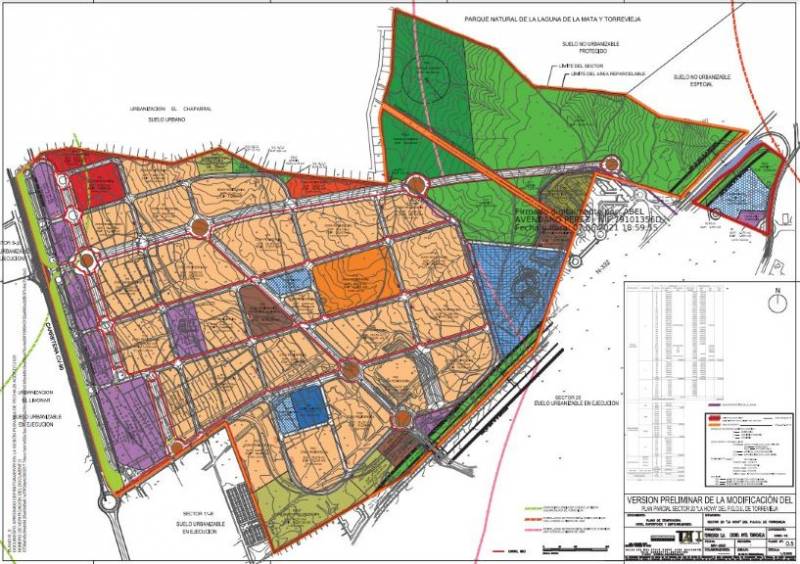 In another administrative decision that is likely to stir up controversy, Torrevieja City Hall has given the green light to the largest new housing development in Alicante province – a project that will see the construction 7,490 homes at a cost of 53 million euros.
In another administrative decision that is likely to stir up controversy, Torrevieja City Hall has given the green light to the largest new housing development in Alicante province – a project that will see the construction 7,490 homes at a cost of 53 million euros.Work is set to begin as soon as April on a massive 1.8-million-square-metre plot, and when completed, the La Hoya Sector-20 urbanisation will have the capacity to house 18,000 new residents, the equivalent of the current population of Rojales.
While people can now raise any objections they may have, work is expected to go ahead within the next two months. And there are likely to be objections raised as the site is bordered by the CV-905, the La Siesta Urbanisation, the La Mata lagoon and natural park, the Quirón Hospital, the International Auditorium, and is the last piece of major developable land in Torrevieja.
The main bone of contention is the construction of a road that will link the CV-905 and the N-332, which is right beside the protected natural park. They’re essentially removing and cementing over the last piece of untouched green land in the municipality, to the dismay of many who liked to talk a walk in the area.
 In several nearby towns, residents can now sleep easier following the arrest of a repeat offender with a “lengthy” police record in connection with a wave of 23 house burglaries that sparked widespread fear and panic in Rojales, Formentera and Benijófar.
In several nearby towns, residents can now sleep easier following the arrest of a repeat offender with a “lengthy” police record in connection with a wave of 23 house burglaries that sparked widespread fear and panic in Rojales, Formentera and Benijófar.The suspect allegedly climbed the façades of targeted houses before forcing or breaking doors and windows, threatening and intimidating occupants who were at home on at least 10 occasions.
The crime spree had escalated to the point where an emergency meeting of Local Police and Guardia Civil was held a week prior to the arrest, after which surveillance in the three towns was stepped up and police revealed they were searching for someone with “addiction problems”.
Within days, a 32-year-old Spanish man and “prolific burglar” with at least 50 offences on his criminal record, was arrested after allegedly breaking into a house in Almoradí.
Andalucía
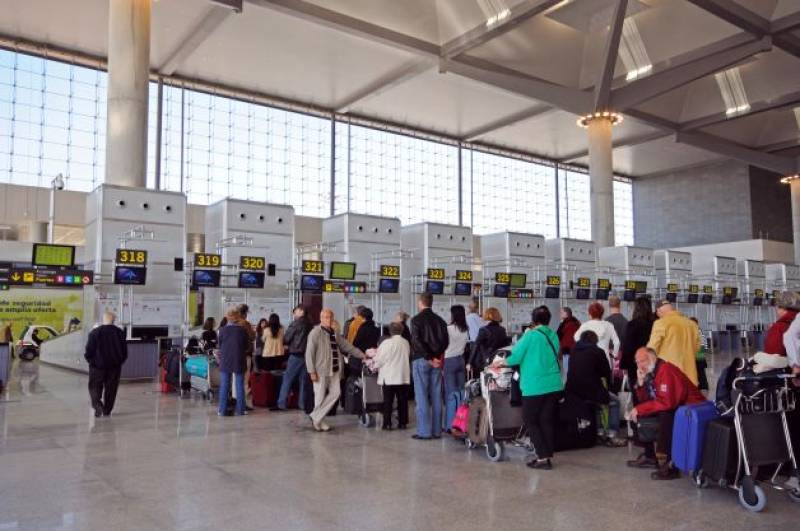 More Ryanair flights from Malaga Airport this summer as the low-cost Irish carrier announces it is putting on 23% more flights at the Costa del Sol hub this high season than it did last year.
More Ryanair flights from Malaga Airport this summer as the low-cost Irish carrier announces it is putting on 23% more flights at the Costa del Sol hub this high season than it did last year.There will be a total of 84 Ryanair routes flying in and out of Malaga Airport this summer, with the frequency of flights the 25 most popular routes – such as Barcelona, Milan Bergamo, Marseille, Marrakech, London and Ibiza – being increased.
In addition, there will be six new destinations available this year, three of them in Germany. Specifically, Ryanair is adding flights to Newquay in the UK; Belfast in Northern Ireland; Gdansk in Poland; and Bremen, Frankfurt Hahn and Paderborn, all in Germany.
The Belfast flight is due to run three times a week, while Newquay, Bremen, Frankfurt Hann, Paderborn and Gdansk will all run twice a week.
There’s also good news for those wishing to travel within the Andalucía region and Spain, as Spain’s national rail operator Renfe is launching a new travel option between Almeria and Madrid from next Monday, February 20, stopping in Granada.
Passengers can already purchase ‘integrated’ tickets for the new Madrid-Almería connection, which combines an AVE high-speed train departing from the capital’s Atocha station at 7.35am with a Media Distancia (MD) Granada-Almería train arriving in Almería capital city at 1.32pm.
Integrated tickets are sold as one journey, guaranteeing the connection of two trains. That means that if the first train is late and you miss the second, you can still get your money back for the whole journey (provided other conditions are met), which you couldn’t do if you bought the tickets separately.
This brings the number of daily train services between Madrid and Almeria to three, with two of them going by way of Granada, and the total number of rail services linking Almeria and Granada every day to four. The new service also stops in the Granada city of Guadix, where it’s estimated that one in every 14 people is a foreigner.

You may have missed…
- These are the exact speeds you need to be driving in Spain to get a fine.
While every Spanish road has a fixed speed limit, e.g. 120 or 90 kilometres per hour, the cameras will never jump to that exact speed when pinpointing which vehicles are breaking the law. - Sleeping Lorca residents stirred by mini-earthquake.
A “mini” earthquake measuring 2 degrees on the Richter Scale woke sleeping locals in Lorca on Thursday morning, which was thankfully a far cry from the devastating Lorca quake of 2011. - Gun ownership grows by 38% in Spain as an effective solution against squatting.
The number of gun licences granted in Spain in 2022 ballooned by 38%, mainly thanks to a legal loophole that ensures the police can immediately evict squatters to ensure public safety. - Murcia shopping centre becomes first in the Region to introduce signage system for the colour blind.
Murcia city’s Nueva Condomina is pioneering the ColorADD system for colour blind people in the Region, implementing the internationally-recognised code at all employee and customer points at the shopping centre. - Benidorm greenlights first skyscraper in Spain powered only by wind and solar panels.
Spain’s first “innovative self-sufficient” skyscraper is to be built in Benidorm, a building that will be powered by wind and solar panels.
Thanks for reading again this week! That’s all we’ve got for you for now but we’ll be back with another bulletin next week.
See you then!
Contact Murcia Today: Editorial 000 000 000 /
Office 000 000 000


















